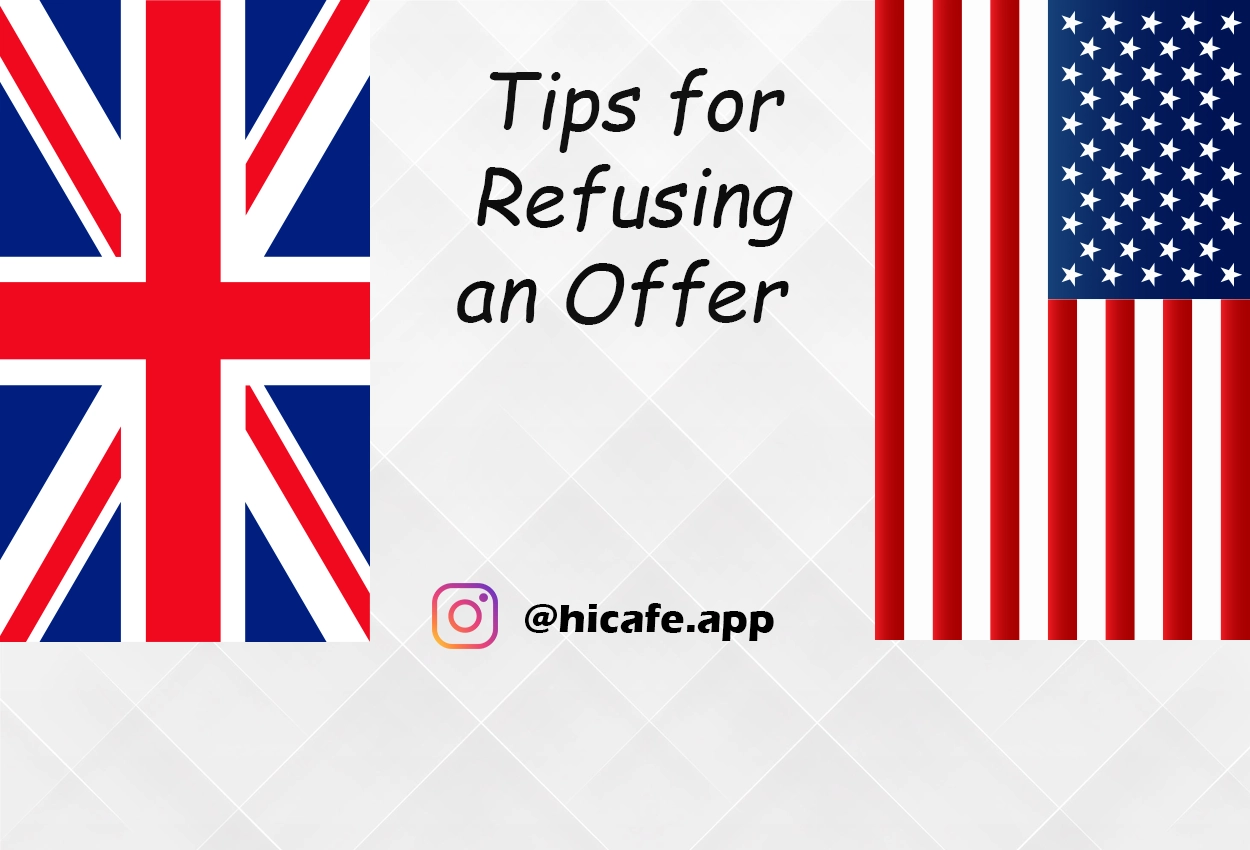
Saying “no” can be tricky, especially when you want to be polite. While a simple “No thank you” does the job, it lacks the fineness that comes with a more nuanced response. This lesson exploresdifferent ways to refuse an offer in English.
Previous Conversation Tip Lesson
Talking About the News in English
Refusing an Offer Politely
Check out ten common native speaker phrases to refuse an offer here.
- It’s very kind of you, but…
Say this to show you appreciate the offer. The “but” shows that you can’t accept it. Example:
Would you like me to grab you a coffee?
It’s very kind of you, but I actually brought my own.
- I appreciate the offer, but …
This is a little more formal than the first. You could say it when someone offers you help that you don’t want.
Can I help you carry those boxes?
I appreciate the offer, but I’m good, thanks. I’ve got it.
- It’s very tempting, but …
You can say this when you want to show that the offer is something you’d normally accept, but there’s a reason you can’t this time.
Want to come hiking with us this weekend?”
It’s very tempting, but I have a prior commitment.
That new gadget looks amazing! You should get it.
It’s very tempting, but I’m trying to save money right now.
- I really shouldn’t.
If someone is trying to persuade you to do something which you don’t want to do, you can say “I really shouldn’t”. To be more polite, you can also give a reason why you’re refusing the offer.
Let’s go out for a drink after work.
I really shouldn’t. I have a lot of work to catch up on tonight.
- I can’t this time.
This is a very useful phrase. You can use it to refuse an offer – but also to refuse to help someone (especially if you also say “sorry”.) Here are two examples:
Want to join us for dinner on Friday?
I can’t this time. I’m already meeting with friends.
Can you help me proofread this document?
I’m sorry, but I can’t this time. I have a deadline to meet.
- It’s a great offer, but …
Say this in a shop when you want to say “no” to a sales assistant.
This is our best deal on a new car.
It’s a great offer, but I’m not looking to buy a new car right now.
- Actually, I think I’m going to pass on it, if you don’t mind.
Say this to a sales assistant to refuse the offer. You might say this after you’ve been speaking for a while.
We could also throw in a free gift with your purchase.
Actually, I think I’m going to pass on it, if you don’t mind. Thanks anyway.
You can also use this expression in social occasions.
Want to come to the party this weekend?
Actually, I think I’m going to pass on it tonight. I’m feeling a bit under the weather.
- Let me sleep on it.
This is a lovely way to say that you need time to decide. Maybe you’ve already decided to refuse the offer, but you don’t want to say that. You can say this in different situations – in a shop, at work, or to friends.
I can offer you a promotion if you’re willing to relocate.
Oh, let me sleep on it. That’s a big decision.
Do you want to invest in our new project?
Let me sleep on it. I’d like to consider all my options.
- Can you give me a couple of minutes?
This is another phrase you can use to delay giving your decision. You could use it in a shop and then move away from the sales assistant.
This is our most popular model. You should really try it out.
Can you give me a couple of minutes? I want to look around a little more.
- Not today, thanks.
Because this expression is short, it’s direct and less polite. You can use it when someone approaches you in the street and wants to give you a leaflet.
Would you like to donate to our cause?
Not today, thanks.
Want to buy a raffle ticket?
Not today, thanks.
Conclusion
By incorporating these advanced phrases into your vocabulary, you can navigate various scenarios with consideration. Remember, politeness goes a long way in gracefully saying “no thank you.”
Next Conversation Tip Lesson
Essential Weather Vocabulary in English
Related Conversation Lessons
None
Practice Conversation with HiCafe App
By using HiCafe App, you can join free discussion events and Practice English Conversation online or in-person and improve your verbal skills.
All Conversation Lessons
To see and read all of our conversation lessons, you can visit our Improve English Speaking Skills page.


